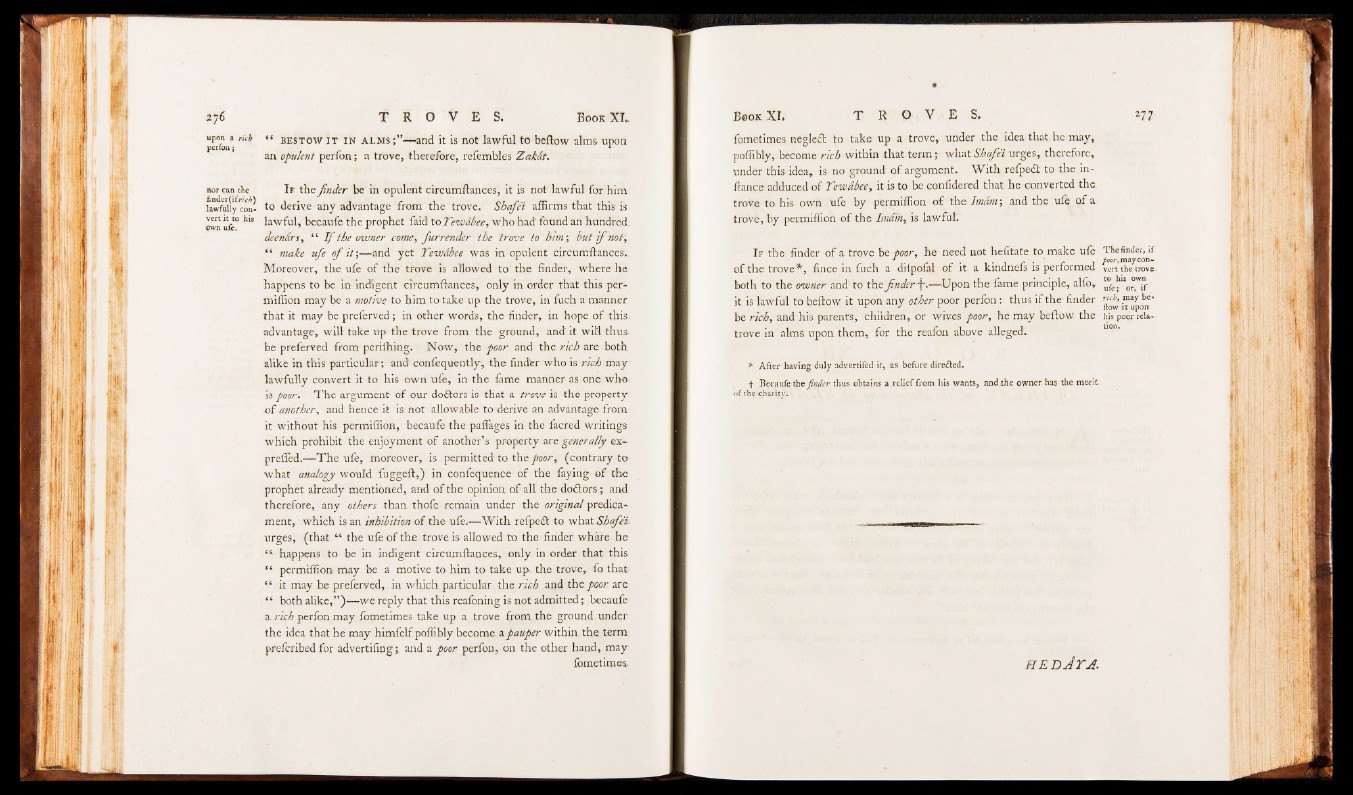
upon a rich
per fon j
nor çjin thç
£nder(ifr/V£)
lawfully conv
ert it to his
Qwn ufe.
“ b e s t o w i t i n a l m s ; ” — and it is not lawful to bellow alms upon
an opulent perfon; a trove, therefore, refembles Zakdt.
If the finder be in opulent cireumftances, it is not lawful for him
to derive any advantage from the trove. Shafei affirms that this is
lawful, becaufe the prophet faid to Tewdbee, who had found an hundred.
deendrs, ‘ 1 I f the owner come, furrender the trove to Mm; but i f not',
“ make ufe o f it-,— and yet Tewdbee was in opulent cireumftances..
Moreover, the ufe of the trove is allowed to the finder, where he
happens to be in indigent cireumftances, only in order that this per-
miffion may be a motive, to him to take up the trove, in fuch a manner
that it may be preferved; in other words, the finder, in hope of this,
advantage, will take up the trove from the ground, and it will thus
be preferved from perilhing. Now, the poor and the rich are both
alike in this particular; and confequently, the find'er who is rich may
lawfully convert it to his own ufe, in the fame manner as one who.
is poor. The argument- of our doftors is that a trove is the property
o f another, and hence it is-not allowable to derive an advantage from
it without his permiffion, becaufe the paftages in the lacred writings
which prohibit the enjoyment of another’ s property are generally ex-
prefled.— The ufe, moreover, is permitted to the poor, (contrary to
what analogy would fuggeft,) in confequence of the faying of the
prophet already mentioned, and of the opinion of-all the doctors; and
therefore, any others than thofe remain under the original predicament,
which is an inhibition of the ufe.— With refpedl to what Shafei.<
urges, (that “ the ufe of the trove is allowed to the finder where he
“ happens to be in indigent cireumftances, only in order that this
“ permiffion- may be a motive to him to take up. the trove, fo that
H it may be preferved, in which, particular the rich and the poor, are
“ both alike,” )— we reply that this realbning is not admitted; becaufe
a, rich perfon may fometimes take up a trove from the ground,under
the idea that he may himfelf poffibly become a pauper within, the. term
preferibed for advertifing;, and a poor perfon, on the other hand, may
fometimesfometimes
negleft to take up a trove, under the idea that he may,
poffibly, become rich within that term; what Shafei urges, therefore,
under this idea, is no ground of argument. With refpedt to the in-
ftance adduced of Tewdbee, it is to be confidered that he converted the
trove to his own ufe by permiffion of the Imam; and the ufe of a
trove, by permiffion of the Imam, is lawful.
If the finder o f a trove be poor, he need not hefitate to make ufe
of the trove*, fince in fuch a dilpofal of it a kindnefs is performed
both to the owner and to the finder f .— Upon the fame principle, alfo,
it is lawful to beftow it upon any other poor perfon: thus if the finder
be rich, and his parents, children, or wives poor, he may beftow the
trove in alms upon them, for the reafon above alleged..
* After having duly advertifed it, as before directed.
+ Becaufe the finder thus obtains a relief from his wants, and.the owner, has the merit,
of thecharity;
T h e finder, i f
poor, may convert
the trove
to his own
ufe; or, i f
richy may be«
flow it upon
his poor relation.
SIT. B A T A .